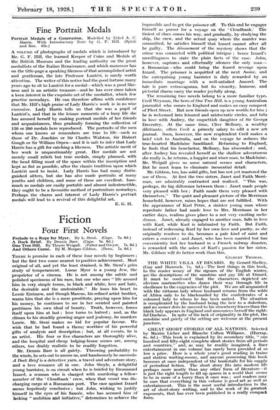Fiction
Four First Novels
THERE is promise in each of these four novels by beginners ;
but the first two come nearest to positive achievement. Most original of all, and yet the least strained, is Mr. Steni's grim study of temperament. Lucas Myer is a young Jew, the proprietor of a cinema. He is not among the subtle and polished specimens of his race, but one who sees " life around him in very simple terms, in black and white, love and hate, the desirable and the undesirable." He loses his heart to
Lorrie Errimew, and though Marcus, his refined artist brother, warns him that she is a mere prostitute, preying upon him for his money, he continues to see in her scented and painted prettiness his own ideal of beauty. Truth, however, forces itself upon him at last ; love turns to hatred ; and, as the climax to his steadily growing anger and jealousy, he murders
Lorrie. Mr. Steni makes no bid for popular favour. We wish that he had found a themc worthier of his powerful gifts of analysis and description ; but, at all events, he is an artist. His four or five characters are thoroughly alive, and the hospital and cheap lodging-house scenes are, among others, too drably realistic to be readily forgotten.
Mr. Dennis Barr is all gaiety. Throwing probability to the winds, he sets out to amuse us, and handsomely he succeeds. A Dock Brief is a detective yarn, a travel and adventure story, and a love romance all in one. John Stoyle, a delightful young barrister, is on circuit when he is briefed by Emmanuel Izzard, a seaman who is charged with murdering a fellow- member of the Cloudbank crew, when that vessel was dis-
charging cargo at a Rumanian port. The case against Izzard seems hopelessly conclusive ; but John, wishing to justify himself in the eyes of his fiancee, who has accused him of lacking " ambition and initiative," determines to achieve the
impossible and to get the prisoner off. To this end he engages himself as purser for a voyage on the Cloudbank.' The tiniest of clues comes his way, and gradually, by studying the ship, the crew, and the actual quay where the murder was committed, he satisfies himself that Izzard cannot after all be guilty. The denouement of the mystery shows that the crime was connected with political intrigue ; hence Izzard's unwillingness to state the plain facts of the case. John, however, captures and effectually silences the only man- s Rumanian—who could bring the feared revenge upon Izzard. The prisoner is acquitted at the next Assize, and the enterprising young barrister is duly rewarded by an immediate marriage with a well-satisfied Amorel. The tale is pure extravaganza, but its vivacity, humour, and pictorial charm carry the reader joyfully along.
The remaining two novels belong to a more familiar type. Cecil Weyman, the hero of One Tree Hill, is a young Australian journalist who comes to England and makes an easy conquest of Fleet Street. But new friends open up new worlds for him ; he is welcomed into leisured and aristocratic circles, and falls in love with Audrey, the coquettish daughter of Sir George Daventry. At the same time, Clive Melbury, a wealthy dilettante, offers Cecil a princely salary to edit a new art journal. Soon, however, the now resplendent Cecil makes a brief visit to Australia, and on the voyage he seduces the true-hearted Madeleine Sandiland. Returning to England, he finds that his benefactor, Melbury, has absconded ; and, after Audrey has revealed herself as the shallow adventuress she really is, he returns, a happier and wiser man, to Madelaine. Mr. Weigall gives us some natural scenes and characters. But he must learn to eliminate inessential detail.
Mr. Gibbon, too, has solid gifts, but has not yet mastered the use of them. At first the two sisters, Janet and Faith Merri- man, arc admirably contrasted and realized. " This was, perhaps, the big difference between them : Janet made people very pleased with her ; Faith made them very pleased with themselves." The quiet and pleasant picture of the Merriman household, however, raises hopes that are not fulfilled. With the appearance of Karl Petre, a sinister young man whose reprobate father had made love to Mrs. Merriman in her earlier days, realism gives place to a not very exciting melo- drama. Janet, already engaged to another man, falls in love with Karl, while Karl is infatuated by Faith. But Faith, instead of redeeming Karl by her own love and purity, as she originally resolves to do, becomes a pale kind of saint and enters a convent ; and Janet, who has been married but has conveniently lost her husband in a French railway disaster, is rewarded with the ashes of Karl's passion for her sister. Mr. Gibbon will do better work than this.
GILBERT THOMAS.






































 Previous page
Previous page